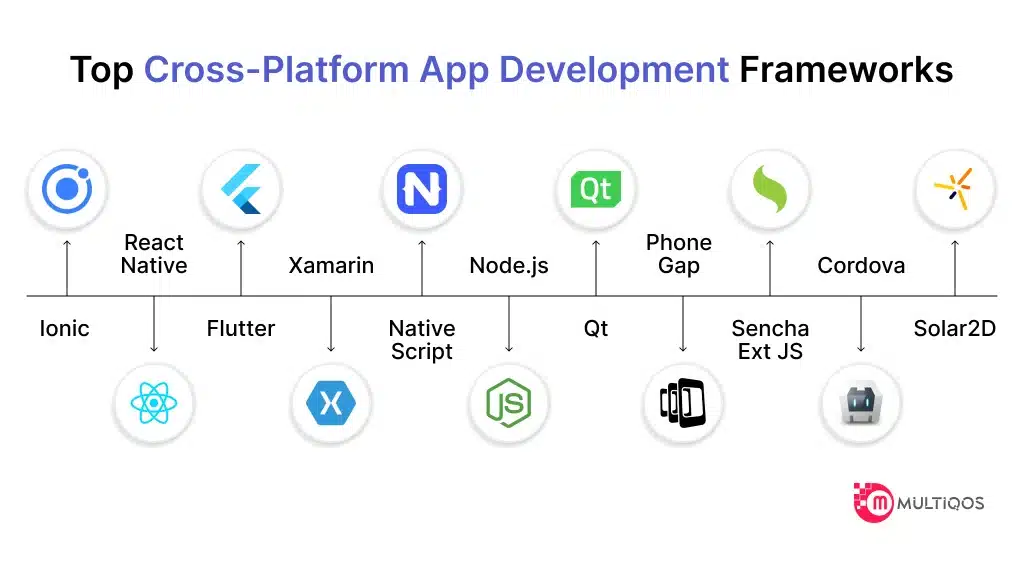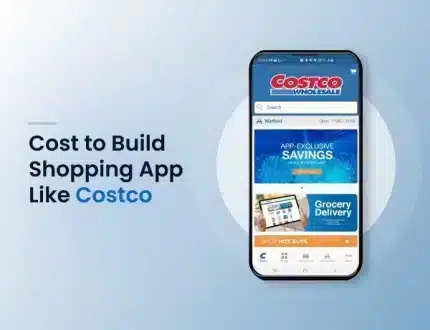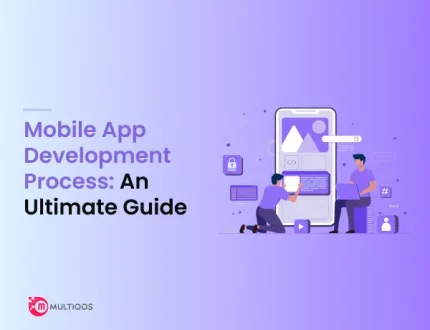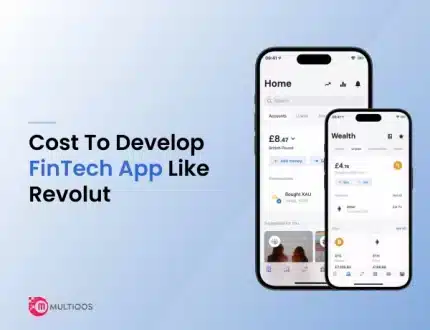Top 11 Best Cross Platform App Development Framework In 2024
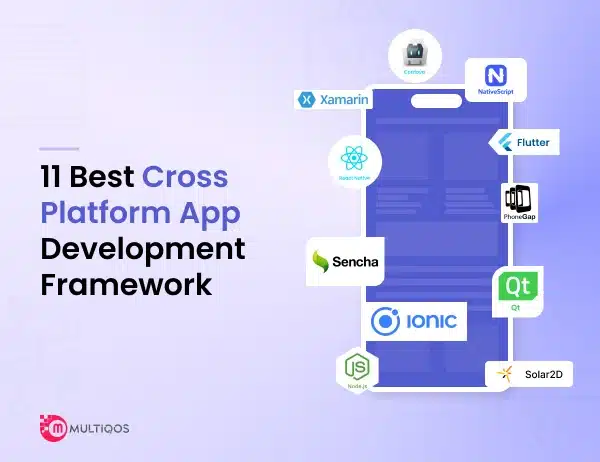
In today’s digital age, mobile apps are inevitable for businesses to reach a wider audience and achieve faster growth. To leverage the benefits of mobile applications, companies must be choosy in picking the right framework for developing exceptional apps.
As of the data published in Statista, Smartphone users around the world had reached 6.4 billion in 2022 and it is expected to cross over 7.72 billion in 2028. This indicates businesses have no choice other than to develop mobile applications for revenue generation and business expansion.
This article briefs in detail about the importance of choosing cross-platform app development. In addition, readers can get useful information on picking the right cross-platform framework from the list of top 11 in 2024.
What is a cross-platform app development framework?
The need to create mobile applications supporting multiple platforms to reach the target audience leads to the growth of cross-platform app development. Cross-platform app development is the process of building mobile applications that can run on various platforms without any separate coding.
A Cross-platform app framework provides an environment using which mobile app developers can build an efficient and cost-efficient mobile app. It allows developers to utilize the same source coding for building apps to run on platforms like Android, iOS, Windows, and so on.
What are the Advantages of Cross-platform App Development Frameworks?
The global market size of the cross-platform app development framework reached around USD 120 billion in 2023 and it is forecasted to exceed USD 546.7 billion by 2033. This shows the demand for Cross-platform apps and their efficiency.
Here are the few advantages businesses can avail through by picking Cross-platform app development frameworks.
- Faster to develop apps that support multiple platforms.
- Lower app development cost.
- Reaches a wider audience.
- Maintains app consistency across platforms.
- Supports code reusability.
Top Cross-platform App Development Frameworks
1. Ionic
Ionic is a lightweight open-source UI toolkit that enables developers to build modern and high-performing cross-platform apps. This remarkable framework uses top programming languages that allow developers to access native platform controllers.
This framework has a lot of pre-built UI elements, themes, and plugins that empower developers to build apps quickly. In addition, Ionic comes with a robust CLI (command-line interface) that makes app development and deployment much easier compared to other frameworks.
Programming Language: JavaScript, HTML5, CSS and Cordova Wrapper
Mobile App Examples: Calla, Firstly, Marketwatch, ChefSteps, TD trading, InstantPot, and so on.
Key Features:
- Angular base – The presence of the Angular package in the Ionic framework brings the Angular ecosystem to the development. It integrates all the essential functionality and Angular core libraries developers need.
- Cordova Plugins – Cordova plugin in Ionic offers an exceptional API using which developers can utilize the native device function with JavaScript code.
- Native feel – It helps developers to develop excellent cross-platform applications with a native-life feel and works perfectly on all platforms.
- Community Support – The ionic framework has extensive community support using which developers can easily avail pool of resources.
2. React Native
React Native is one of the most trusted and popular cross-platform app development frameworks that allow developers to build native apps. The framework provides a best-in-class JS library using which developers build better user interfaces.
Developers can enjoy the benefit of getting immense support from a vibrant and constantly growing React Native community. Free access to numerous libraries and development tools allows react native developers to improve their productivity.
Programming Language: JavaScript
Mobile App Examples: Instagram, Walmart, Tesla, Skype, Bloomberg, Facebook, and so on.
Key Features:
- Native performance – Unlike other frameworks, React Native complies with true native components. This helps developers to build apps closer to native performance or even better.
- Reusable components – React Native promotes reusable components that allow developers to build modular and scalable applications. These kinds of components can be used across the sections of the app.
- NPM libraries support – React Native uses NPM (Node Package Manager) for installation which is very easy to handle. This allows non-skilled people to learn and adapt quickly. Also, it is easy to research and use NPM commands.
- Lower development time – When compared with all major frameworks, React Native takes substantially less time for app development.
3. Flutter
Flutter is a predominant and powerful cross-platform app development framework powered by Google. Flutter App development enables developers to build beautiful and natively compiled cross-platform applications from a single codebase.
Flutter framework has strong community support along with a wide range of resources and tutorials. This makes it easier for new developers to learn and adapt quickly.
Programming Language: Dart
Mobile App Examples: Google Ads, eBay Motors, BMW, Alibaba, Dream11, and so on.
Key Features:
- Beautiful and customizable UI – Flutter framework provides a rich set of customizable widgets. This empowers developers to design expressive and flexible user interfaces for their apps.
- Open source – Flutter is an open-source free-to-use cross-platform app development framework that allows developers to build apps with native app performance.
- Google support – Flutter is supported by the Internet giant Google which allows the framework to evolve constantly. This makes this framework the go-to choice for developers to build robust mobile applications.
- Easy app management – Developers would find it easy to develop and maintain mobile apps through Flutter’s SDK. Customizable widget of Flutter enables developers to build apps with smooth UI in low code.
Read also: Flutter vs React Native: Which one Best?
4. Xamarin
Xamarin is a completely different and well-streamlined framework that empowers developers to build native apps much quicker. It is a stable and adaptable platform to develop highly functional and high-performing mobile app solutions.
The framework allows developers to access the platform-specific APIs and well-known software tools like Visual Studio to build exceptional apps.
Programming Language: C#, and .NET
Mobile App Examples: Captio, APX, Microsoft Reel, Alaska Airlines, FreshDirect, Insightly, and so on.
Key Features:
- Easy maintenance – Xamarin framework offers numerous tutorials and guidelines for code help that makes app development much easier for developers. Also, app maintenance and updates are much easier in Xamarin than in other frameworks.
- Code reusability – Xamarin encourages developers to write code once and use it everywhere. The framework supports 96% code reuse which is a more mesmerizing aspect.
- Highly safe and secure – Xamarin’s code signing capabilities with Visual Studio make it the best framework for developing a safe and secure app for all devices.
- Choice of priorities – The framework supports two approaches for app development. Performance-driven app development approach and Native app development approach. Developers get a choice of priorities to build apps according to the project’s needs.
5. Native Script
Native Script is a popular framework that provides ultimate access to native APIs that allow developers to build high-performing native apps. By utilizing the rich set of UI components & plugins, developers can craft beautiful and feature-rich apps.
Native Script is the most preferred framework for developers to build mobile apps with WORA functionality. The availability of numerous plugins and web resources eliminates the need for third-party solutions for app development.
Programming Language: JavaScript, TypeScript
Mobile App Examples: Strudel, BitPoints Wallet, Daily Nanny, Regelneef, Dwitch,
Key Features:
- Supports Angular – Native Script framework supports Angular and TypeScript. This enables developers to build apps with exceptional programming codes.
- Uses Vue.js framework – It supports Vue JavaScript, using which developers can build native apps by integrating third-party libraries.
- Dark Theme – Developers can opt for dark theme mode for app development. This encourages developers to build applications with elegant style and UI.
- Embraces Android X – Native Script supports AndroidX packages. This allows developers to utilize the latest library packages and components to develop apps smoothly and straightforwardly.
6. Node.js
Node.JS is the open-source JavaScript runtime environment mainly used by developers to build server-side and script development. Node.js Development helps developers build fast and simple-to-scale cross-platform apps.
The large and active community support for Node.js for web app development allows developers to get all the essential support to build excellent mobile applications.
Programming Language: JavaScript
Mobile App Examples: LinkedIn, Uber, eBay, Netflix, GoDaddy, PayPal, and so on.
Key Features:
- Fullstack JS – Node JS comes with the ability to use JavaScript on the server side and also on the client side making it a full-stack JavaScript.
- Asynchronous and Event-Driven – Node JS APIs are non-blocking in nature, this means they are server-based and do not wait for data. This makes it impressively fast code execution.
- Scalable – Node JS framework is highly scalable and operates asynchronously in nature. This promotes developers to stick with the agile mode of app development.
- Very Fast – Applications developed in Node JS have lesser reaction time. This allows developers to process all the data inquiries at a time.
7. Qt
Qt is the most favored cross-platform app development framework for developing, testing, and deploying GUIs and mobile applications. Using this framework, cross-platform app developers can build apps using languages like Python, Ruby, and Java binding.
The framework comes with an array of pre-designed components for creating excellent GUIs. Also, it supports automated testing. The large and active community support of the Qt framework enables developers to access a pool of tools and resources.
Programming Language: C++, Python, Javascript, C# and Rust
Mobile App Examples: Google Earth, CRYENGINE, Autodesk Maya, VLC media player, VirtualBox, and so on.
Key Features:
- XML parsing – Qt framework offers two sets of APIs (stream-based and DOM-based) specifically for reading and writing an XML-based file format.
- SQL database access – By using Qt SQLite plugin developers can easily access the in-process SQLite databases for the app development.
- Multimedia Widget – Qt framework provides additional widgets and controls that expand the capabilities of Qt Multimedia and Qt Widgets modules.
- Large Community – Qt framework has large and active developer community support. This allows developers to access a pool of tools and resources to build high-performing applications.
8. PhoneGap
PhoneGap is an impeccable framework that offers a cloud infrastructure for developers to streamline their app development process. The framework leverages the existing web technologies to build impressive mobile applications.
PhoneGap is the best framework for developing a simplistic mobile-based web application with a native app touch. It is the cost-effective option for developing responsive mobile web applications.
Programming Language: Java, CSS, C++, C#, Objective C, and JavaScript
Mobile App Examples: Wikipedia, Paylution, Health Tap, TripCase, and so on.
Key Features:
- Robust backend system – The robust backed system of the PhoneGap framework helps developers to build applications tremendously fast without any hard effort.
- Flexibility – Developers do not need to learn hi-tech complicated languages to build attractive apps. Just by knowing basic web languages and with the tons of libraries provided by PhoneGap, they can build an efficient app that runs on all platforms.
- Easy development – PhoneGap framework uses existing web technologies like HTML5, CSS3, and JavaScript developers would find it easier to build apps.
- Native plugins – The architecture of the PhoneGap framework is plugin-able. This means developers can build native apps by using APIs in a modular way.
9. Sencha Ext JS
Sencha Ext JS allows developers to build exceptional HTML5 applications for desktop devices, tablets, and mobiles. By using this framework, developers can access the Ext JS JavaScript library, and a variety of tools & resources for app development, testing, and deployment. It is the most preferred cross-platform app development framework for building data-intensive business apps and real-time web apps.
Programming Language: JavaScript
Mobile App Examples: Samsung, NetApp, Dailymail, Livepages, linkeo, Spreaker, Realtime, and so on.
Key Features:
- Customizability – Sencha Ext JS cross-platform app development framework comes with 140+ pre-built highly customizable UI components. This facilitates a rapid app development process.
- Fast JS data grid – The framework Sencha Ext JS provides comprehensive libraries and UI components like grids, pivot grids, layouts, D3 adaptors, and so on. This encourages developers to build apps much faster.
- Tested UI components – It provides a lot of pre-installed tested and high-performing UI components. This facilitates developers to build data-intensive applications with the ability to run on all platforms.
- Extensive documentation – The framework has a large set of community support. With such support, there is no hassle of accessing resources and documentation for developers to build applications.
10. Cordova
Apache Cordova is an app development framework that allows app developers to build hybrid mobile applications using standard web technologies. The framework provides a range of plugins that help developers to add more features to the apps.
The Cordova framework encourages cross-platform application developers to make use of native resources for building apps with native features.
Programming Language: HTML5, CSS3, and JavaScript
Mobile App Examples: FanReach, Pacifica, Cocoon, Evothings Studio, NSB/APP Studio, GapDebug, and so on.
Key Features:
- Common Line Interface – By using the command-line tool provided by the Cordova framework, developers can easily build apps and compile code for multiple mobile platforms.
- Pre-built plugins – Cordova framework has exceptional plugin API support. This allows developers to inherit anything the application needs through writing custom native code.
- Fast app development – Cordova promotes developers to utilize the same codebase for building hybrid applications. This eases the worries for developers on app development and fastens the app development process.
- Community support – The Cordova app development framework is a complete and mature framework with large community support. This allows developers to access a pool of resources and tools to achieve desired app development results.
11. Solar2D (Corona SDK)
Solar 2D is a free software development kit used by developers to build 2D mobile applications for all mobile platforms. Using this framework, developers can build gaming apps with remarkable results.
Solar 2D is a lightweight, easy-to-use framework mainly used to build graphically intensive mobile gaming applications.
Programming Language: Lua
Mobile App Examples: The Ukulele App, Gohenry – Pocket Money Manager, Retro Pixel, Thief’s Treasure, Knights of the Card Table, Fuddle Wuddle, and so on.
Key Features:
- Rapid fast development – With numerous plugins and a pool of active developers, Solar2D cross-platform app development framework supports rapid fast app development.
- Wide range of native functionality – Developers can call any native library or APIs through C, C++, Obj-C, or Java language on the Solar2D framework. This allows developers to access a wide range of resources for app development.
- Real-time code change – Solar2D app development framework provides an instant-update simulator. Using this developers can easily update their code and view the changes instantly in real-time.
- Stability and reliability – The Solar2D app development framework uses the powerful scripting language Lua which has strong and vibrant community support. The lightweight and fast scripting language ensures game app development is stable and reliable.
Which is the Best Cross Platform Mobile App Development Framework in 2024?
Picking the best cross-platform mobile app framework for your business always relies on the factors you are looking for and what you are going to achieve through the app. Every cross-app platform framework has its own pros and cons; it’s on businesses to determine what kind of app solution they are seeking.
It’s better to have a clear thought on your business objective and purpose of developing a mobile application for your business. Based on the insights, sort down the relevant framework to build an exceptional mobile app.
Some of the elements that play a key role in determining the right cross-platform mobile app framework are listed below, take a look.
- Size of your company
- Developer’s expertise
- Type of app solution your business needs
If you are running a small business and you need to build a simple design mobile application, then opting for a flutter framework for startups would be the best option. On the other hand, if you are about to build a powerful and better app for your business growth then preferring ‘React Native’ or ‘Sencha Ext JS’ will be the best.
However, the trends of 2024 reveal apps built on ‘React Native, Flutter and Xamarin’ are performing well in the market. The key to be noted is to hire mobile app developers or an excellent team of mobile app experts for designing, building, and maintaining.
Let’s Wrap It Up:
Building cross-platform would be the best choice for businesses as it releases apps much faster with an array of benefits. In today’s market, you can easily find a wide option of cross-platform app development frameworks. Picking the right framework based on the business priorities is the crucial thing.
At the same time, make sure that you are engaging with the most revered and reliable Mobile App Development Company having expertise in building world-class applications.
FAQ on Top Cross-Platform App Development Frameworks
Cross-platform app development delivers a unified user experience on all existing platforms. Developers can re-use the source code to make apps run on multiple platforms. Also, cross-platform supports faster app development at lower cost and reaches your apps to a wider audience.
Cross-app development is the most preferred platform for building mobile apps by businesses from all verticals. Here are the factors that ensure your business needs cross-platform apps.
- If you need to build apps for multiple platforms.
- If you are not sure about identifying the right audience for your business.
- If you are running a startup business.
- If your business needs an MVP.
- If you decide to build an efficient application quickly on a low budget.
It is highly recommended to cross-check the below-listed factors to ensure hiring a reliable app development company.
- Company’s portfolio & clientele
- Expertise
- Client testimonials
- Global presence along with the size of their development team
- NDA agreements
There are no conclusive thoughts or evidence to determine whether cross-platform apps are less or more secure than native apps. It depends upon the product specification. However, native app development comes with specific in-build security features like file encryption and intelligent fraud detection. That doesn’t mean cross-platform app development is less secure.
To be honest, the cost-effectiveness of the app development truly depends upon complex requirements and the specific-system features. However, when compared with others, cross-platform app development takes less time and a single developer can build an efficient app. This makes the development cost lower than others, but it truly depends upon the project.
Well, building a cross-platform app is as easy as cutting a pie. All you need is to pick the right cross-platform app framework based on your needs. The right framework ensures your app is built with smooth functions and is efficient to run on all platforms.
Get In Touch

